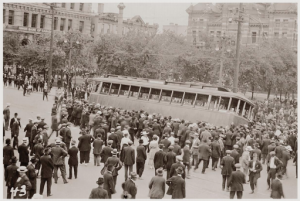
Just three months after Britain and Germany and their respective allies began the Great War that would last over four years, Charles O’Brien, the Socialist MLA for Rocky Mountain from 1909 to 1913, declared in November 1914: “the master class, in order to avert impending disaster…had to do something to divert the attention of the workers. They chose war.” O’Brien, a former miner, logger, and railroader, sponsored legislation to improve protections for workers in the Coal Mines Act, improvements that the provincial government failed to implement. Members of the United Mine Workers of America (UMWA) voted to make the Socialist Party their official voice.
In the cities, during a recession from 1913 to 1916, the Industrial Workers of the World organized unemployed workers to eat in restaurants without paying, to sleep in churches, and to demand government public works with union pay for the unemployed.
While the war created jobs both on the military and home fronts, the benefits went to big companies. Their workers received wage increases well below inflation. With unemployment decreasing, workers no longer feared being fired if they unionized. By 1918, workers were prepared to wage sympathy strikes. In Edmonton, in January, 17 Edmonton union locals voted to strike if the city resisted a firefighters’ union demand that the senior firefighter become the new fire chief. That caused employer pressure on the city council that gave the firefighters a victory. Eight months later, striking freight handlers in Calgary averted a federal back-to-work order after half of Calgary unionists struck on their behalf, forcing the government to negotiate with the freight handlers.
So, as 1919 opened, workers felt a sense of agency in dealing with unfair employer treatment. But governments responded with repressive legislation meant to restore the control of capitalists over workers.
In the cities, during a recession from 1913 to 1916, the Industrial Workers of the World organized unemployed workers to eat in restaurants without paying, to sleep in churches, and to demand government public works with union pay for the unemployed.
While the war created jobs both on the military and home fronts, the benefits went to big companies. Their workers received wage increases well below inflation. With unemployment decreasing, workers no longer feared being fired if they unionized. By 1918, workers were prepared to wage sympathy strikes. In Edmonton, in January, 17 Edmonton union locals voted to strike if the city resisted a firefighters’ union demand that the senior firefighter become the new fire chief. That caused employer pressure on the city council that gave the firefighters a victory. Eight months later, striking freight handlers in Calgary averted a federal back-to-work order after half of Calgary unionists struck on their behalf, forcing the government to negotiate with the freight handlers.
So, as 1919 opened, workers felt a sense of agency in dealing with unfair employer treatment. But governments responded with repressive legislation meant to restore the control of capitalists over workers.
